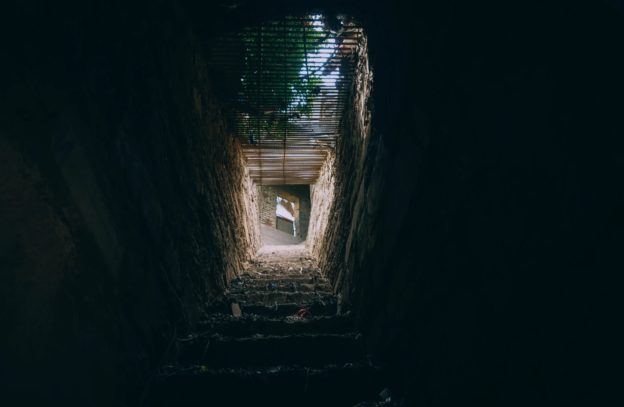If you were to describe the place where wicked people go, how would you describe it? Bildad has a go — unfortunately, it’s not really what his friend Job needed to hear.
Previously:
1:1-5 | 1:6-12 | 1:13-22 | 2:1-6 | 2:7-13 | 3:1-10 | 3:11-26 | 4 | 5:1-7 | 5:8-27 | 6 | 7 | 8:1-7 | 8:8-22 | 9 | 10 | 11 | 12 | 13:1-16 | 13:17-14:22 | 15 | 16 | 17 |
Translation:
18:1 Then Bildad the Shuhite answered, saying:
2 “Until when will you (pl.) hunt (lit: set a snare) for words?
Consider, and then we speak.
3 Why are we counted like cattle?
Why are we stupid in your eyes?
4 One who tears his soul in his anger — for your sake will the earth be forsaken?
And the rock removed from its place?“
- Verse 2 begins as Bildad accuses Job and any supporting his argument (the you is plural) of playing games with words (using the imagery of hunting as sport)
- Verse 3 could be retranslated: “Are we as dumb as cows?”
- Essentially, Bildad is accusing Job of challenging the foundations of the world by his protests of innocence.
- Instead of disrupting the “place” (Hb: makom) of the earth, Bildad instead invites Job into the place where wicked men live (in his neat moral universe) – cue verses 5-21
- Christopher Ash (Wisdom of the Cross, 201) has a good analogy, following the idea of “place”: “Bildad is the moral equivalent of the very house-proud person… Job, they think, is like a rude guest who comes in and wants to trash the place.”
5 “Moreover, the light of wicked men is put out;
And it does not shine, the fire of his flame.
6 The light darkens in his tent;
And his lamp above him is put out.
- Firstly, Bildad preaches that wicked men have not even a hint of light when they die. It is put out, or extinguished (v5, v6)
- Bildad, having heard Job wish to “make his bed in the darkness” (17:13), asserts only wicked people go there — “Job, you must be wicked.”
7 “His strong steps are restricted;
His counsel casts him down.
8 For he is cast into a net at his feet;
And he wanders over netting.
9 It seizes by the heel — a trap;
It grips him — a snare.
10 Hidden in the ground in his rope,
And his trap [is] upon the path.“
- In these verses the key idea is the trap (“net” in v8, “snare” in v9, “rope” in v10). The wicked one struts around strongly, but he is caught. He cannot escape.
11 “Terrors all around scare him,
And chase him at his feet.
12 His strength is famished;
And calamity ready for his stumbling.
13 It consumes layers (lit: limbs) of his skin;
It consumes his limbs — the firstborn of death.
14 He will be torn from the tent of his confidence;
And brought to the king of terrors.
15 It dwells in his tent, [they] that are not his(?);
Scattered upon his dwelling [is] sulphur.
16 From beneath, his roots dry up;
From above it withers, his branches.“
- Is this place Hell? We need to be careful not to import New Testament terminology anachronistically. But it’s certainly a description of a grim post-mortem reality for the wicked. Bildad is channelling Jonathan Edward’s “Sinners at the Hands of an Angry God” here.
17 “His memory perishes from the earth;
And he has no name in public (lit: upon the face of outside).
18 They will thrust him from light to darkness;
And from the world they will banish him.
19 There is no offspring for him and no posterity among his people;
No survivor in the places he sojourned.
20 Over his days, those of the west are appalled;
And those of the east are gripped [with] horror.
21 Surely this is the dwelling place of an unjust one,
And [those in] this place does not know God.“
- The point of Bildad’s lengthy description of these terrors is that he assumes Job’s feelings of despair is proof he belongs in this terrifying place.
- But Bildad is wrong that Job deserves to go there – we are told repeatedly that he is “blameless and upright, fearing God and turning away from evil” (1:1). His neat and tidy logic is a bit housebound, and does not fit in the real world out there.
- There is a danger too in our lives when we take theoretical truths and make them the lens that we judge another person’s attitudes and actions. Once I told a friend who was under a heavy weight of despair, “I think you’re suffering because you love money too much.” Needless to say, it didn’t go down well. It’s certainly true people can suffer from loving money too much. But it wasn’t right for me to use that logic and misapply it on a friend whose circumstances and heart attitudes weren’t fully known to me.
